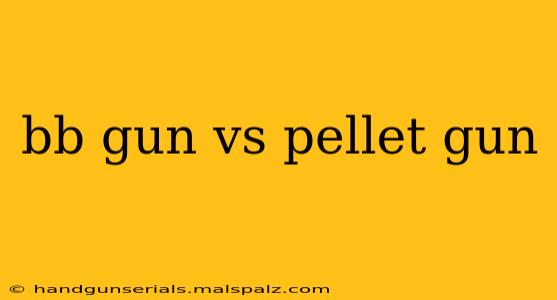Choosing between a BB gun and a pellet gun can feel overwhelming, especially with the wide variety available. Both are popular airguns, but they have key differences that impact accuracy, power, and overall shooting experience. This comprehensive guide will break down the distinctions, helping you decide which airgun best suits your needs.
Understanding the Core Differences: BBs vs. Pellets
The most significant difference lies in the ammunition:
-
BBs: These are small, round, typically steel or lead projectiles. They are inexpensive and readily available. However, their spherical shape leads to less accuracy compared to pellets, especially at longer ranges. BBs are generally less powerful than pellets.
-
Pellets: These are heavier, more aerodynamic projectiles, usually made of lead (though some are available in other materials like copper or alloy). Their pointed or wadcutter designs improve accuracy and range significantly. Pellets are generally more powerful than BBs, offering greater penetration and stopping power.
Power and Range: A Comparative Analysis
Power and range are directly linked to the ammunition and the airgun's mechanism. Generally:
-
BB guns: Typically have lower muzzle velocity (the speed at which the projectile leaves the barrel) resulting in shorter range and less power. They are often suitable for plinking (casual target shooting) at close range.
-
Pellet guns: Usually boast higher muzzle velocity and greater energy, leading to longer ranges and more stopping power. This makes them better suited for hunting small game (where legal) or more serious target shooting.
Accuracy and Precision: Which is More Accurate?
Accuracy is a crucial factor when choosing an airgun. Here's how BB guns and pellet guns compare:
-
BB guns: Due to the spherical shape and lower velocity of BBs, accuracy tends to suffer, especially at longer distances. Wind also affects BBs more significantly than pellets.
-
Pellet guns: The aerodynamic design of pellets significantly improves accuracy and precision, particularly at longer ranges. This makes them ideal for target practice and hunting applications.
Factors Influencing Accuracy:
Beyond ammunition, the quality of the airgun itself plays a significant role in accuracy. Rifled barrels (with spiral grooves inside the barrel) improve the spin and stability of both BBs and pellets, enhancing accuracy in both types of airguns.
Cost and Maintenance: A Budget-Friendly Consideration
BB guns and pellet guns vary in price depending on the brand, features, and quality. However, a general comparison can be made:
-
BB guns: Tend to be cheaper to purchase initially, with BBs being less expensive than pellets.
-
Pellet guns: Usually have a higher initial purchase price, with pellets costing more than BBs. However, the improved accuracy and power often justify the extra cost for many users.
Choosing the Right Airgun: Factors to Consider
The best airgun for you depends on your intended use:
-
Casual plinking or target practice at close range: A BB gun might suffice. Its affordability and ease of use make it a good entry-level option.
-
Hunting small game (where legal), serious target shooting, or longer-range accuracy: A pellet gun is the better choice. Its increased power, accuracy, and range are ideal for these applications.
-
Budget: Consider the initial cost of the gun and the ongoing cost of ammunition.
-
Experience level: Beginners may find BB guns easier to handle and maintain.
Conclusion: Making the Informed Choice
Ultimately, the "better" airgun – BB or pellet – depends entirely on your individual needs and preferences. By carefully weighing the factors outlined above, you can confidently select the airgun that best aligns with your shooting goals and budget. Remember always to prioritize safety and follow all local regulations regarding airgun use.

